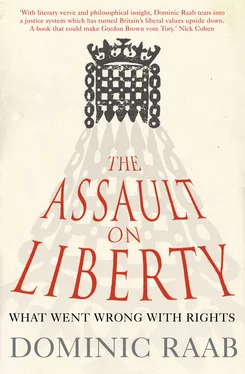Finally, faced with mounting opposition in 2008, the Home Secretary based her proposals for a forty-two-day maximum limit on what she referred to as a ‘precautionary principle’. The precautionary principle is derived from environmental law, which presents a rather different set of challenges to counter-terrorism. There has been no explanation of why this environmental principle is relevant or what it might mean in the context of terrorism. It appears little more than a thin veneer to allow the government to keep returning to Parliament for additional police powers on the basis of an unspecified threat that may or may not materialize at some indeterminate point in the future.
While there is not a shred of hard evidence to support the case for extending detention without charge beyond twenty-eight days, the government has encouraged a common, but wholly misleading, assumption that extending pre-charge detention would help deal with the classic ‘ticking bomb’ scenario – that we need longer than twenty-eight days to hold terrorist masterminds or suicide bombers who might otherwise abscond to launch a terrorist attack. In fact, experience suggests the opposite. The key players in a terrorist plot are, in practice, the least likely to be held for the maximum period of detention without charge, because they are the suspects that tend to be questioned and investigated first. During Operation Overt, all the alleged ringleaders were arrested and charged within twenty-one days. It was only those either subsequently released (without further suspicion) or charged with lesser offences that were held for twenty-eight days.
This case illustrates an emerging trend: it is precisely those most likely to be innocent or least involved in a terrorist conspiracy who are most likely to be held for the longest period of detention. Far from being necessary to deal with imminent threats to public safety or terrorist masterminds, extensions of pre-charge detention are generally used to follow up secondary leads and suspects. Each extension of the maximum period of detention risks exacerbating this trend – delaying the point at which the police need either to charge or release those on the fringe of their investigation. It is often said that those with nothing to hide have nothing to fear, but the reality of police investigations suggests that those with nothing to hide may be most at risk from extensions of pre-charge detention.
If an innocent person is detained for weeks or months, the consequences can be personally disastrous, even if he is eventually released. The case of Lotfi Raissi demonstrates the devastating impact that prolonged detention without charge can have on a wholly innocent individual. Raissi was an Algerian-born pilot living in London. He was arrested in Britain after 9/11, because he had attended the same flying school as the bombers. US authorities accused him of having taught the 9/11 bombers to fly the planes that crashed into the Twin Towers in New York. The FBI quickly realized that this was unlikely to be true. However, the British police held Raissi in pre-charge detention awaiting extradition to the US on the flimsiest basis. He was not held on suspicion of terrorism offences but on trivial grounds, including that he had lied on his pilot’s licence by failing to reveal previous knee surgery – an allegation that was subsequently proved false as well.
It appears that the US authorities were still interested in questioning Raissi, but no longer thought it likely that he was involved in 9/11. The Court of Appeal in Britain later criticized both the US and UK authorities for deploying this ‘device’ to keep Raissi in detention without charge for over four months. The court went on to criticize the British police and the Crown Prosecution Service for ‘serious defaults’ in allowing this abuse of process. The court exonerated Raissi of all allegations, delivering a judgment that paved the way for him to seek compensation. The case shows how, in the wake of a terrorist attack, the police can come under considerable pressure to bend the law at the expense of a suspect who may prove to be entirely innocent.
In this instance an innocent man’s life was left in ruins. Raissi was twice stabbed by prisoners during his period of detention, because of allegations that he had links to the 9/11 terrorists. He suffered two nervous breakdowns under the strain and did not sleep properly for seven years. He lost his job and found himself blacklisted from finding a new one. He became entirely dependent on his family, although in the wake of his arrest both his wife and his brother’s wife also lost their jobs.
If extending pre-charge detention would undermine a fundamental freedom, with severe consequences for the innocent that are imprisoned – as half of all those held for twenty-eight days have been – there is an increasing number of warnings that, far from making us safer, an extension to forty-two days may actually jeopardize our security. In addition to criticisms by human rights lawyers and NGOs, a growing chorus of security experts have publicly declared their opposition to forty-two days – on the basis that it is either irrelevant as a security measure or actually risks making the terrorist threat worse.
While the government has consistently cited evidence from MI5 on the growing numbers involved in terrorism to bolster its case for forty-two days, it is striking that the current and previous two heads of MI5 have either criticized or refused to back an extension beyond twenty-eight days. In an interview in July 2007, the former head of MI5, Stella Rimington, made clear her opposition to an extension: ‘It behoves us all to question when governments want to bring in increasingly draconian measures.’
This was followed by further, more recent, criticism from her successor at MI5, Baroness Manningham-Buller, who declared she could not support the extension to forty-two days ‘on a practical basis or on a principled one’, arguing that the measure was both disproportionate and unworkable. The current Director General of MI5, Jonathan Evans, also refused to publicly back forty-two days. The subsequent riposte from ministers – that MI5 is not responsible for pre-charge detention – flies directly in the face of its regular reliance on MI5’s assessments, not to mention Tony Blair’s public claim in August 2005 that MI5 had then asked for an extension. The reality appears to be that MI5 positively backed an extension beyond fourteen days – but refused to back an extension beyond twenty-eight days.
There is further disquiet within the ranks of the police. Chief Constables and other senior officers have expressed their opposition or reservations in private, with senior officers at the Metropolitan Police letting it be known that the forty-two-day proposal is unworkable, and therefore either irrelevant or counter-productive as a security measure.
Other experts warn against two specific risks generated by prolonged detention without charge. First, the disproportionate effect on innocent young Muslim males risks creating widespread resentment and serving the twisted narrative that extremists and terrorists thrive on – Britain targeting Muslims at home as well as abroad in Iraq and Afghanistan. Such draconian measures alienate whole communities, nurturing the friendly sea within which terrorism thrives. In short, a further extension beyond twenty-eight days risks serving as a recruiting sergeant for terrorism.
During the debate on ninety days, Lord Condon, former head of the Metropolitan Police, raised this concern in explicit terms: ‘If we now go back and make it look like we are going to challenge yet again the point of 28 days that we have reached, I fear that it will play into the hands of the propagandists, who will encourage young men and women…to be misguided, brainwashed and induced into acts of martyrdom.’
Читать дальше












